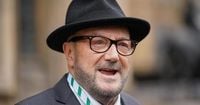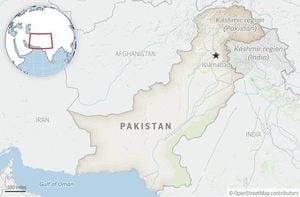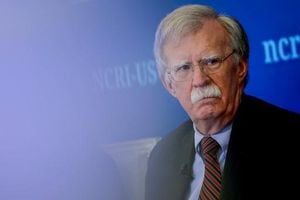On a crisp Saturday morning, September 27, 2025, the familiar hum of Gatwick Airport was interrupted by an incident that quickly rippled through the British political landscape. George Galloway, the outspoken leader of the Workers Party of Britain and former Member of Parliament, along with his wife and party deputy chair Putri Gayatri Pertiwi, found themselves stopped by counter-terrorism police upon their return to the UK from Moscow via Abu Dhabi. The episode, brief but charged with political meaning, has ignited fierce debate over the boundaries of security, civil liberties, and the role of opposition voices in Britain.
According to a widely reported statement from the Metropolitan Police, “On Saturday, September 27, counter terrorism officers at Gatwick Airport stopped a man in his 70s and a woman in her 40s under Schedule 3 of the Counter Terrorism and Border Security Act 2019. Neither of them were arrested and they were allowed on their way.” The couple, Galloway aged 71 and Pertiwi aged 40, were temporarily detained, questioned, and then permitted to continue their journey—yet the ramifications of the stop have continued to reverberate long after they left the airport.
Schedule 3 of the Counter Terrorism and Border Security Act 2019 grants officers sweeping powers at UK ports and borders. It allows them to stop, question, search, and detain individuals to determine whether they have engaged in hostile activity that could threaten the nation’s security or economic wellbeing. The Act also authorizes examination of goods to see if they have been used in connection with such activities. Those stopped may be required to provide passwords or PINs to electronic devices, though it remains unclear whether Galloway or his wife were asked to do so in this instance, as reported by The Guardian and The Herald.
The response from the Workers Party of Britain was swift and unequivocal. In a statement shared on X (formerly Twitter), the party condemned the stop as “politically motivated intimidation,” declaring, “There was never any chance of an offence. We were obstructed from providing legal support and the conduct of the affair has been designed to intimidate political opponents of the drive towards war with Russia and China.” The party further insisted that “freedom of speech is lying on the scrap heap.”
Galloway himself is no stranger to controversy or to the spotlight. His political journey has spanned decades and multiple parties. He began as a Labour MP, representing Glasgow Hillhead from 1987 to 1997 and Glasgow Kelvin until 2005. After his expulsion from Labour in 2003, he became a leading figure in the now-defunct Respect Party, winning seats in Bethnal Green and Bow and later in Bradford West. In March 2024, Galloway made headlines by winning a by-election in Rochdale as the Workers Party of Britain’s first MP, only to lose the seat in the general election a few months later. Despite these setbacks, he has signaled his intention to return to frontline politics, announcing plans to contest the Glasgow Southside seat in the upcoming 2026 Scottish Parliament election, as reported by The Herald.
The timing and context of Galloway’s stop have fueled speculation and debate. The couple had just returned from Moscow, where they were photographed in Red Square in May 2025 attending President Putin’s Victory Day celebrations. Earlier in the year, Galloway had traveled to Iran to collect an award named after Ismail Haniyeh, the political leader of Hamas. These trips, coupled with Galloway’s vocal criticism of British and US foreign policies—especially regarding support for Ukraine—have made him a lightning rod for both supporters and detractors.
Throughout his career, Galloway has positioned himself as a fierce critic of Western interventionism and what he describes as the “drive towards war with Russia and China.” His opponents, meanwhile, have accused him of offering comfort to authoritarian regimes. The Workers Party’s statement following the Gatwick incident echoed this long-standing posture, asserting, “Our party condemns the attempt to intimidate those who seek amity rather than enmity with the rest of the world.”
The powers exercised under Schedule 3 are not without controversy. Civil liberties advocates have repeatedly warned that such laws risk chilling free speech and political dissent. The Act empowers officers to act on suspicion alone, without the need for concrete evidence of wrongdoing, which critics say opens the door to arbitrary or politically motivated stops. The Workers Party’s claim that they were “obstructed from providing legal support” only added fuel to the fire, raising questions about due process and the rights of those detained under counter-terrorism laws.
For some, the incident at Gatwick is emblematic of a broader climate of suspicion and securitization in British politics. Galloway’s party decried the stop as an effort to “intimidate political opponents,” particularly those critical of current foreign policy directions. Others, however, argue that the authorities were simply exercising their legal mandate to protect national security, especially given the couple’s recent travels to Moscow and their high-profile political activities.
Galloway’s public persona has always been larger than life. Beyond Parliament, he has hosted shows on Iran’s state-backed Press TV and, in a moment that still lingers in the British public’s imagination, participated in the reality TV show Big Brother in 2006. His infamous performance—crawling on all fours and pretending to be a cat during a task with actress Rula Lenska—drew both ridicule and fascination, and a website was even set up to track the council tax paid by his constituents during his TV stint. Such episodes underscore his ability to both court and command public attention, for better or worse.
Saturday’s events have reignited debate not only about George Galloway himself but about the balance between security and liberty in the UK. The government maintains that powers like those in the Counter Terrorism and Border Security Act 2019 are essential tools in a world of evolving threats. Yet for Galloway and his supporters, the stop at Gatwick represents something more troubling—a warning sign for the health of democracy and dissent in Britain.
As the dust settles, one thing is clear: the intersection of politics, security, and civil liberties remains as contentious and consequential as ever. Whether viewed as a justified precaution or a heavy-handed act of intimidation, the Gatwick incident has once again placed George Galloway at the center of a national conversation he has long relished—and long provoked.






